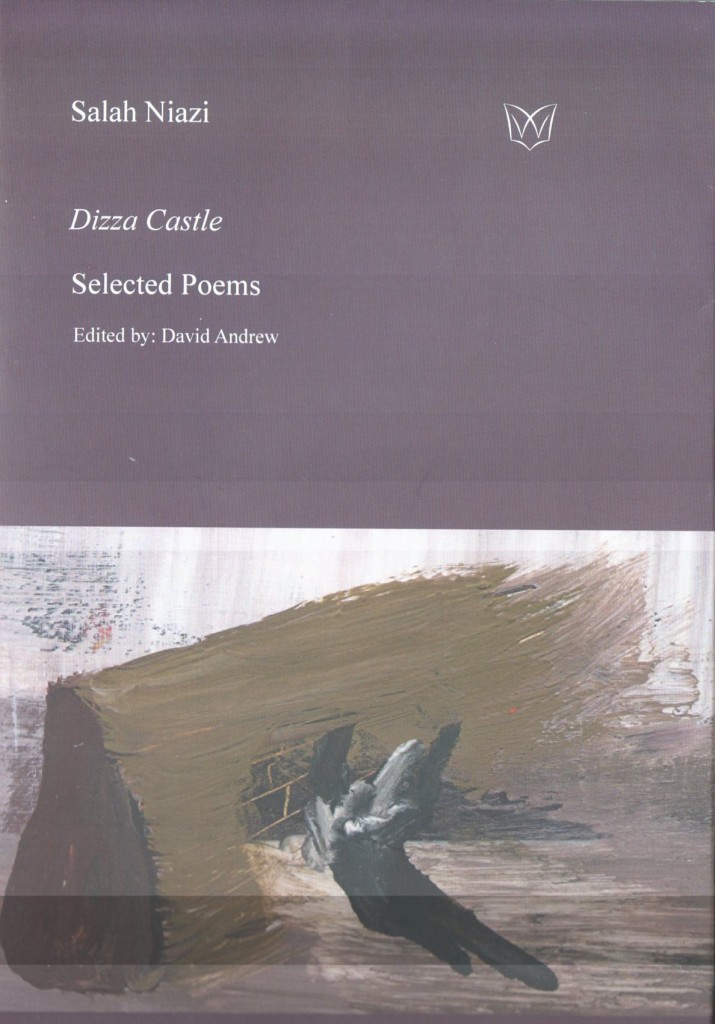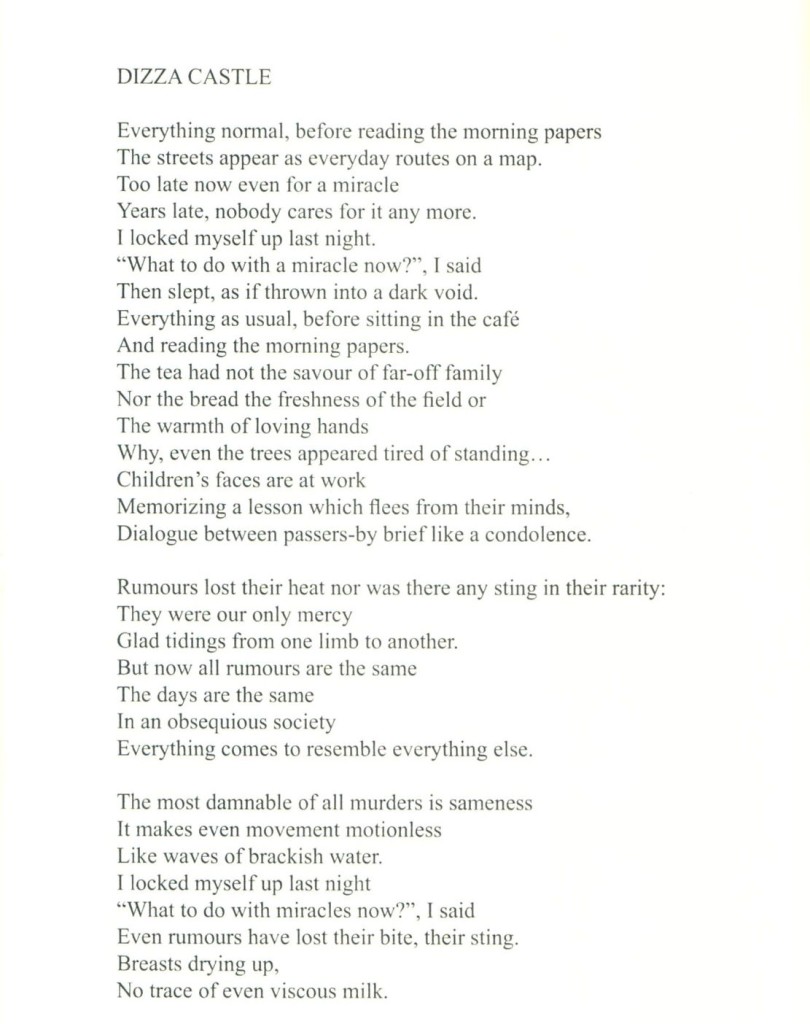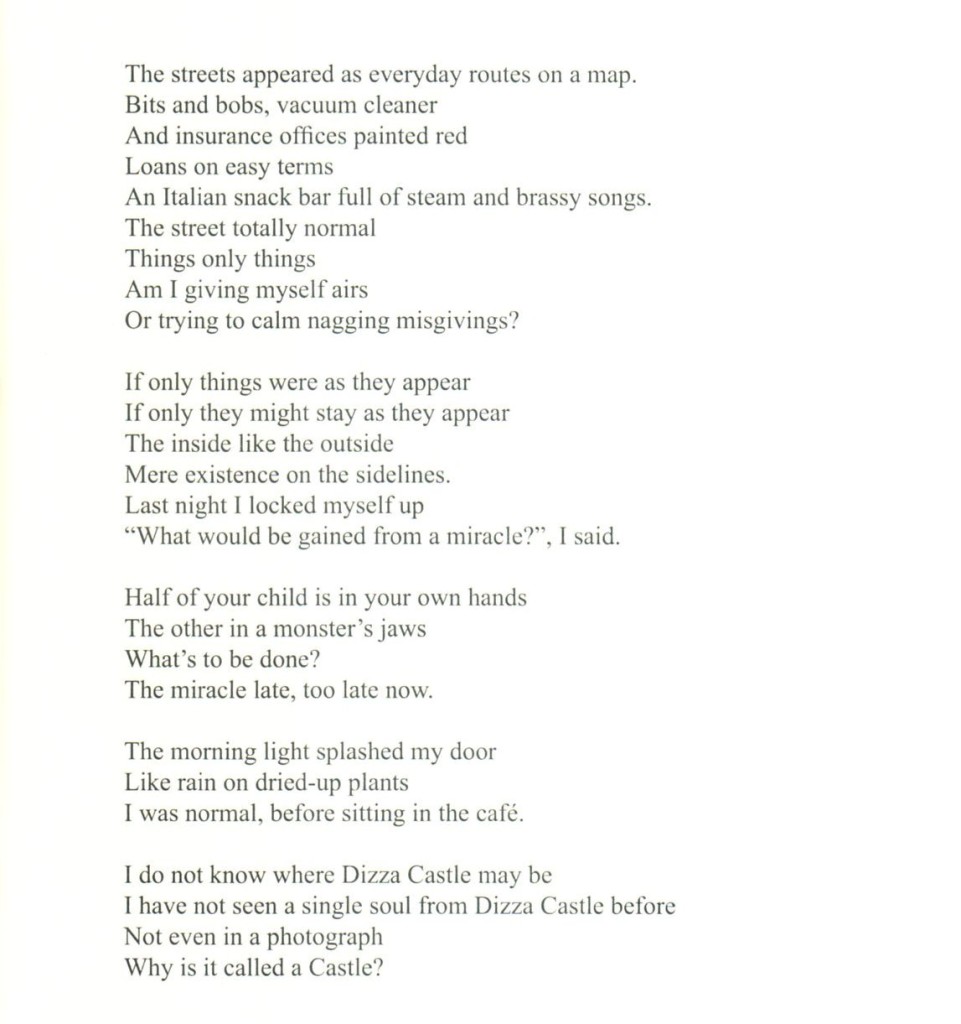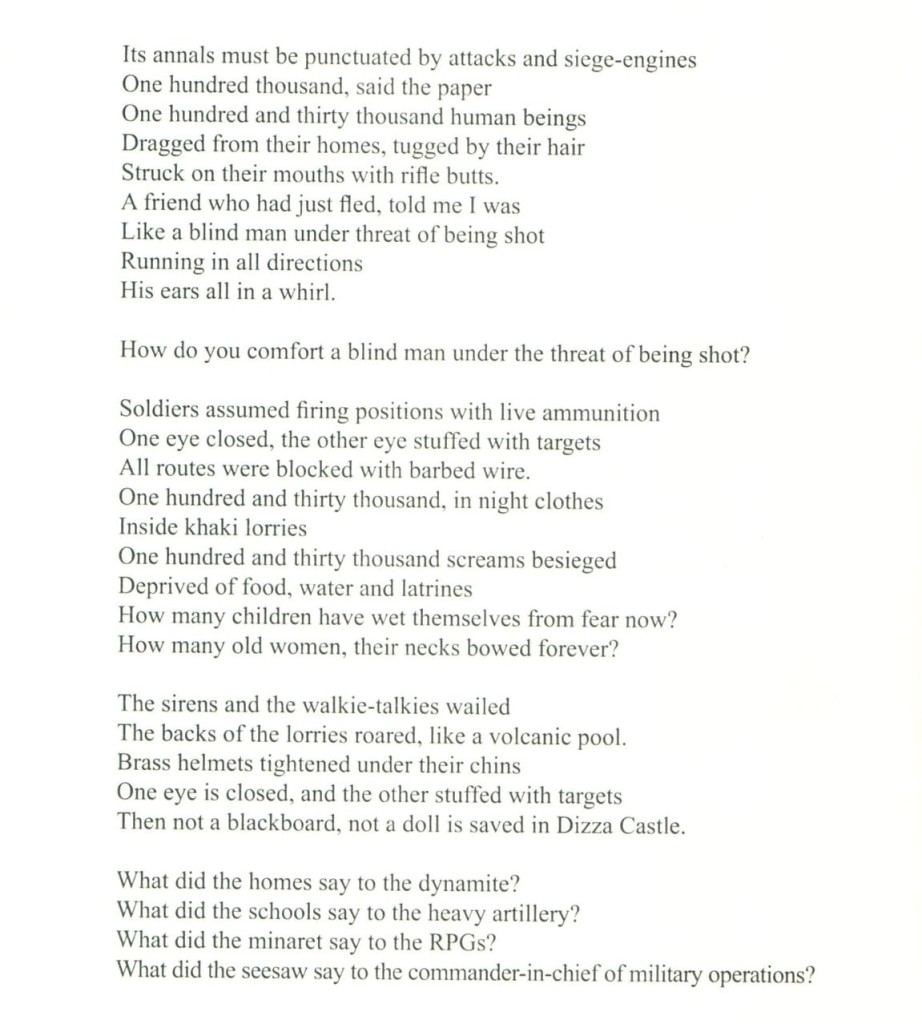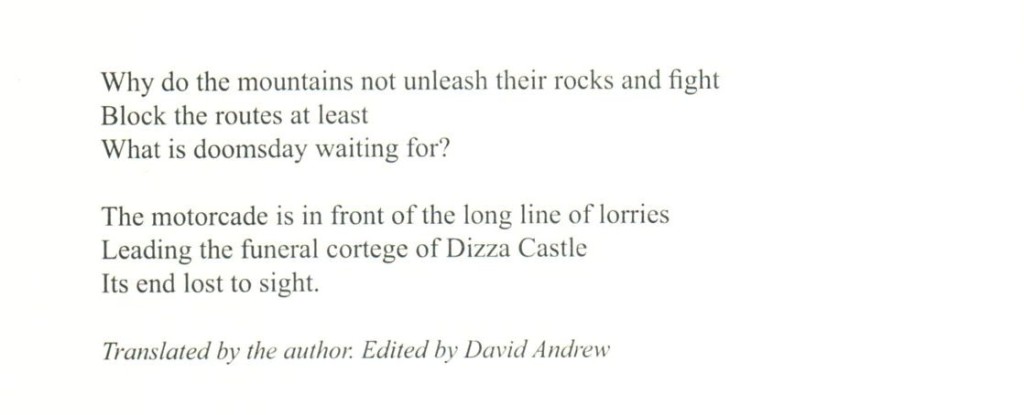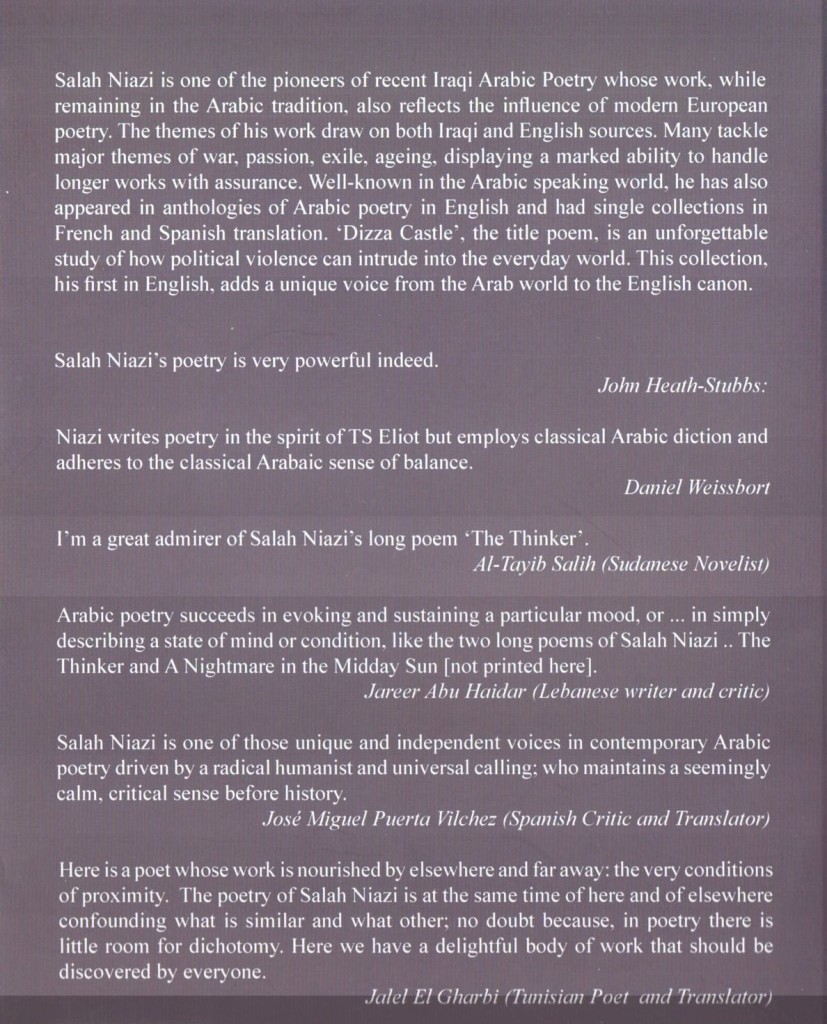The Iraqi poet Salah Niazi
(SILVIA PIO, edited by)
DISCO
Drumbeats smash into their echoes
and shatter like the screams of broken trees.
To and fro, as if the flames licks the wood first;
Again lick the wood and again before it takes hold
Disco lights scrape the walls and relentlessly return
green, blue, yellow, red
ablaze like molten metals.
Faces are fragments, stained
You close your eyes, and darkness
remains colourful
Stains of smallpox consume the flesh like acid drops
Green, yellow, blue, red
Mythical insects scrape the faces to and fro momentarily
The senses cease their control
and lose all essence, the reflexes are crippled
Colours of molten metals oozing over it, and the insects relentlessly
scraping
The head empties and swells,
and as it swells
Inside it creep the melted colours and the saw like insects
The body floats, bereft of joints and bones
and under the feet, gravity is paralysed.
The ground moves under intoxicated feet and fades away.
Translated by Dikra Ridha
***
FLAT-HUNTING
I was flat-hunting
The area tedious with repellent noises
Long and dark were the tunnels of my headache
Suddenly a young sparrow
Alighted in the middle of the road
The edges of his beak were still yellow
Like undried paint
He was turning, picking up dust, hopping
Perhaps for the first time
His beak and legs, like matchsticks, put on trial
How proud he was with his first self-reliance
His wings were quivering
Like a young plant in cold winter sunlight
Intoxicated by his first experience
He chirps like a bell
A dark brown car was approaching
In confusion he flew low in front of it
He was sent up into the air
Three metres higher than the height of the car
He fell as if wingless
Like a small and mouthless cotton-wool ball
In my palm, he is stiff
His body still warm
How soft his feathers
His open eyes are like two sesame seeds.
I can see no proper shroud to wrap him in
No grave to bury him in
Inside a new envelope, I sealed him
With the tip of my tongue, with no address
I put him on the grass solemnly and silently
I was just flat-hunting
The area was tedious, with repellent noises
Long and dark were the tunnels of my headache.
Translated by the author
***
THE ASSASSINATION OF MAHMOUD BRAIKAN
You only, Mahmoud, know what really happened,
Your eyes alone recall with precision their eyes in the darkness,
Only your ears preserve the voices of your killers
O dissecting tables, O laboratories
This crime cannot possibly remain concealed for ever
Show us their features printed on the eyes of Mahmoud
The last thing a man sees remains in the retina
Such a crime cannot be obliterated so easily.
If it is thus, then every science is rendered impotent
Uncover from the hammer and anvil (1) bones what the assassins said
to him
What answer Mahmoud gave to the knives
The dialogue between a killer steeled to his task
And the victim at the point of extermination
Is the most painful in the history of speech
O Guardian Angels (2) who are on the shoulders of every human
being
Doubtless you know the facts in every detail
From the knock on the outer door to the last withdrawal of breath
But you are bound by duty to silence and absence
It is your duty to obey but your obedience is utterly blind
You cannot be called to the witness stand
Even if the Earth were to be turned upside down
But tell me, Guardian Angels, did you ever lose your balance
When the blows rained down without a break one after the other?
Did you stay there on his shoulders until he gasped his life away?
Translated by Sebastian Hayes
Notes: (1) Hammer and Anvil are the names of two tiny bones in the middle ear;
(2) In the Islamic tradition, the two Guardian Angels (l. 15) actually stand on the shoulders, they do not just hover in the air as depicted in Victorian prints.
***
BACK FROM WAR
Outside the barracks
Folk are waiting apprehensively
As if at the hour of the bugle.
The war is over,
The survivors are coming back
In the distance, the military lorries come into sight,
Guns are heaved up lengthwise
Above the soldiers’ heads
As if floating up to their necks
These are the remnants of the still-alive-and-kicking.
Shoulders are without epaulettes,
Uniforms without buttons
Their arms are just like oars in a dry river
Plying from one arid wave to another
Crying Noah, Noah, Noah
Remnants of those still-alive-and-kicking
In an assembly like this
There is no grieving for lost limbs,
Any scrap of a person is enough
The important thing is still to be alive
Lost limbs are of no concern.
Every soldier on the approaching lorries
Is counted as alive and dead – both at once.
Alive and dead both at once
Uncertainty and certainty
Life and death
Are interwoven now
In a moment, the truth will be made plain,
The dead will be dead forever,
And the living will be in part alive
Critical moments are, no doubt, shattering
Can save, otherwise kill, in an instant
As a flash of lightning, unawares, catches you
As a flood, does not give you time
To collect your belongings
Put on your clothes half decently
In such a gathering
Joy and grief will soon be two separate things
And selfishness will show itself
As the most powerful element in man’s nature.
Look then
She is like a stricken boat.
A women searching for her son
Is like a stricken boat
Inches away from her an embrace
So strong that
There will be no dividing them
Feast and funeral
Are two neighbouring trees
Their fingers are interlacing now
But how different they are.
Translated by the author
Dizza Castle is the name of a village inhabited by Kurdish people for centuries. It was destroyed by Saddam Hussein with chimica weapons in March 1989. When he heard this news, the poet Salah Niazi wrote this poem from London.
Salah Niazi is one of the pioneers of Iraqi Arabic poetry, whose work, while remaining in the Arabic tradition, also reflects the influence of modern European poetry. Born in Nasiriyeh –south of Iraq – in 1935, he obtained a BA in Arabic Language at the University of Baghdad. In 1954, he began his career as newsreader in State Radio and Television, while teaching Arabic language and literature in secondary schools.
Exiled in 1964, he worked as newsreader, and Head of the Cultural Talks Unit at the BBC Arabic Service for almost two decades, during which he completed a PhD at the University of London. He has lectured on ‘The Art of Translation’ in both the Polytechnic of Central London and the University of Edinburgh; and was head of the Association of Iraqi Academics in the UK.
He retired from the BBC in 1984 and became the editor of Alightirab Al Adabi, a four-monthly magazine for Arab writers in exile, until 2003. He has lived in Britain since 1963.
Dr Niazi has published many works of literature, including nine collections of poetry and five books of criticism. Among these are: The poetic merits of Gilgamesh Epic and From the soliloquies of Shakespeare. He has also published translations (into Arabic) of Macbeth, Hamlet and King Lear, The Old Capital by Yasunari Kawabata, The Winslow Boy by Terence Rattigan, and the first twelve sections of James Joyce’s Ulysses.
His poems have been translated into many languages. He is featured in all major anthologies on modern Arabic poetry – such as Modern Poetry of the Arab World by Abdullah al-Udhari, Iraqi Poetry Today by Saadi al- Samawi, Modern Arabic Poetry by A. K. Al-Janabi and Moderne Arabisce Dichtung by Stefan Weidner.
Two books of his poetry have appeared in Spanish: El Viento and La Luna de Bagdad: and the Spanish poet, Ana Julia Conzalez Aswad, has published a small book of poems with the title: Salah Niazi y las conciones para pueblos sin palomas.
His autobiography was published under the title A grafted twig in a foreign tree. A translation of his poems in French has recently been published under the title Choix de poèmes (link) edited by Jalel El Gharbi.

A brief interview with Salah Niazi
Tell us about your latest poetry activities
I was the guest of honour in al Mannouba university in Tunis and gave two poetry recitations. I published a poem in the Long Poem Magazine, then was asked by the editors to read it in the Barbican, London. On the 15th April 2015 I was honoured by the Humanitarian Dialogue Establishment in London. I will give two poetry readings in Madrid following an honour received by the Spanish Ministry of Culture.
What is poetry to you?
Poetry to me is just like water to young thirsty plants.
Originally published on 7 May 2015.


